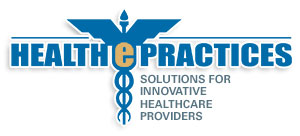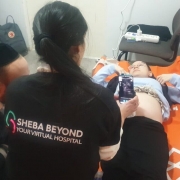Telemedicine and the Ukraine

Pregnant patient and Ukrainian refugee Sarah Misk using Sheba Beyond’s telehealth technology in Kishinev, Moldova, March 2, 2022. (Sheba Medical Center)
How Can I help?
Almost two months into the crisis in the Ukraine with no end in sight, its somewhat comforting to see the telemedicine/telehealth community rallying to try and do what they can to provide remote medical support to those still in the Ukraine, and refugees crossing the borders. Now, telehealth companies are offering free digital health services to fill some of the healthcare voids created by the war.
This article discusses various ways U.S. clinicians can participate and how any reader can contribute to the clause.
VSee is a video telehealth platform with a 14-year history supporting health efforts in North America, the Middle East, Africa, conflict zones, the International Space Station, and refugee camps. VSee developed Aimee, a telehealth app that “brings together more than 2,000 U.S.-based physicians to provide free on-demand doctor visits covering all medical specialties, including Emergency Room and trauma.” VSee is a video telehealth platform with a 14-year history supporting health efforts in North America, the Middle East, Africa, conflict zones, the International Space Station, and refugee camps.
VSee is the telehealth platform used by www.theteledentists.com. Thank you, Milton Chen, for all you do. Read about it here:
CTeL is a nationally recognized 501(c)(3) non-profit research organization focused on telemedicine and virtual care and has organized the Telehealth4Ukraine Coalition which is working to bring together telehealth providers to support virtual humanitarian healthcare efforts in Ukraine and the surrounding region. The goal of the Coalition is to produce a dynamic database of healthcare providers that humanitarian organizations can utilize for virtual care support.
https://www.telehealth4ukraine.org/
Dr. Irving Loh writes about his efforts working with CTel and a as co-founder and chief medical officer of an international healthcare artificial intelligence company based in Poland and the U.S
More International Efforts
Viveo Health, an e-health platform based in Estonia, recently announced it is focusing its Telehealth without borders initiative on Ukraine through its ViveoCares Foundation.
Using computerized systems built in Israel, physicians examine refugees on the Ukraine-Moldova border, check lungs, blood stats and even conduct prenatal ultrasounds. The medical professionals are located at Sheba Medical Center, Israel’s largest hospital.
Dr. Richard Simpson informed me about his efforts in working in conjunction Ina Burgstaller and her team at Bionabu (www.bionabu.com) in the UK. Bionabu has created an international Virtual Clinic for Ukrainian Refugees “Ukraine Refugee Virtual Clinic” (Likarnya Online) that provides direct doctor to patient mHealth triage and consultation services in Ukrainian and Russian through smart devices. U.S. physicians can sign up to participate on the website. Physicians and dentists globally can find more information and register to on-board and receive training at https://www.likarnyaonline.com/en.
Challenges
Some of the age-old challenges to telemedicine still exist. There needs to be sufficient bandwidth, although anyone with a working smartphone can use these services. Patients and providers need to be aware that services like these exist. Fortunately, reimbursement is not a barrier as physicians are generously providing their services for free, but there is a great need for funds to support infrastructure and support staff. There is a need for Russian and Ukrainian speaking physicians. The use of translation services is possible but provides yet another barrier toward the delivery of care.
Joe McMenamin, a telehealth attorney who has been involved in several of these efforts writes, “For one thing, there’s a war on, and responding to American volunteers is not the (Ukrainian) MOH’s #1 priority. It is doubtless short-staffed from deaths and injuries inflicted by the enemy. For another, the providers we are able to reach over there say that what they need more than expertise from foreigners is pharmaceuticals and medical supplies”
On a personal basis
So, you think this is all brand new?
On December 7, 1988, an earthquake destroyed a significant portion of the Spitak Region of Soviet Armenia. The destruction resulted in significant death toll, building and infrastructure destroyed, and the displacement of hundreds of thousands of people. The entire local medical infrastructure was significantly damaged. Before the disaster, the space medical leadership of the United States and the Union of Soviet Socialist Republics were collaborating on joint activities in medicine and biology which resulted in the “Spacebridge to Armenia”.
The leaders of this collaborative effort devised an approach to support a disaster recovery utilizing telecommunications assets. I had the privilege of representing NYNEX Corp in discussion which resulted in participation from several major telecommunications companies as well as NASA.
https://pubmed.ncbi.nlm.nih.gov/10220470/
More than medical help is needed. I want to applaud the work of Dan Abrams, a son of close family friends who is on the ground in Poland leading the effort for World Central Kitchen who is delivering over 100,000 meals a day to refugees.
https://mobile.twitter.com/wckitchen/status/1500223377860186118
How Can You help?
Through several of these links, clinicians can sign up to deliver their expertise. Many of these efforts are charitable organizations and financial contributions are most welcome. Let others know about the good work being done by the telemedicine/telehealth community. Contact me directly at hreis@healthepractices.com with questions, or if you know of other efforts I can share with this community.




Leave a Reply
Want to join the discussion?Feel free to contribute!